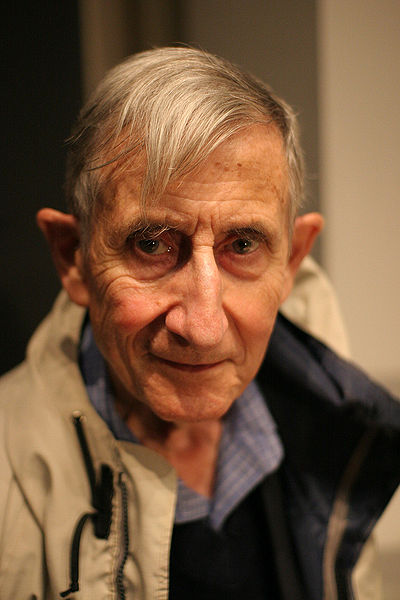Freeman Dyson’s death is a little like the death of the last member of a rare species, only he didn’t even belong to a species, he was a one-off individual, he was singular. The point is, the world is a less interesting place now.
I wrote two posts about him; one was about his astonishingly varied interests; this post is about his one-off-ness and first ran on January 24, 2011.

What an odd-looking person this Freeman Dyson is. His nose is long, his ears stick out, his smile is tentatively friendly, but what to make of those eyes?
Dyson is hard to describe: he’s not like anyone you’ve met before and whatever he says is not what you’ll expect him to say. He’s spent his career and so far, his retirement, in one of the most intellectually-rarified places on the planet, the Institute for Advanced Study. But he doesn’t have a PhD – he says that doctoral students end up middle-aged, over-specialized, trapped, discouraged, and mentally deranged; and not having a PhD is “a badge of honor.” He’s extremely smart and the few people smart enough to understand just how smart he is, are generally in awe of his intelligence. His manners are exquisite and never fail; in conversations he’s omnivorously interested and listens with a sort of stunned joy, surely this person is about to say something delightfully original.
He is the subject of profile after profile after profile, some startlingly good. One of the latest is in The Atlantic, and I’d like to suggest it’s incomplete – an easy shot since every profile is by nature incomplete. But still.
I know Dyson because I’ve interviewed him a lot, sometimes for articles and once for a book I wrote about Jason, an unusual group of scientists to which he belongs, and because now and then I run across him socially. The problem in profiling Dyson is his one-off-ness; you can’t categorize the unique. He is contrarian and contradictory; he reminds me of Niels Bohr’s saying, “the opposite of a profound truth may be another profound truth.”
He’s a card-carrying physicist who likes astronomy better than physicists’ string theory because astronomy is more real; who invents one outrageous but more or less workable space vehicle after another; who believes that extrasensory perception could be possible; who doesn’t believe that climate change is necessarily a danger; and who publishes all this contentiousness in high places.
His membership in Jason means that he works on problems interesting to the defense department. But his chapter in Disturbing the Universe on his service as a teenager doing calculations for the RAF Bomber Command is an eloquent and effective argument against war. He’s the most mathematical – that is, the most theoretical – of theorists, which puts him at the top of physicists’ intellectual hierarchy with experimentalists near the bottom. But he says,”all the really smart things in physics are done by experimenters. They’re a lot smarter [than theorists].”
During the Vietnam War, he helped initiate a Jason study on using tactical nuclear weapons, that is, not the big bombs that blow up whole cities, but the little ones that blow up harbors and camps. The study examined tac nukes’ use and likely effectiveness, a cold-blooded, impartial, technical analysis. Was staying away from the ethical implications difficult? “No,” Dyson said flatly, meaning, of course not: ethical and technical analyses are different things, easy to separate one from the other. As it happened, the Jasons showed that tactical nuclear weapons would be a bad idea because our side offered much better targets than the other side. And if they’d found that using tactical nuclear weapons was a perfectly good idea? No problem again, said Dyson, go with the ethical: “We probably would have then kept quiet and not said anything.”
Which brings me back to the beautifully-written profile in The Atlantic, whose last line sums up the profile’s point, that Dyson is “emotionally incapable” of seeing the human component of the climate problem; that he sees only the sweetness of the technological fix, and not the abyss to which our technology and science are taking us.
I have no idea whether the author is right or not. The Faustian scientist-type sounds stupider than you’d think Dyson would be. Dyson wrote in the first chapter of Disturbing the Universe – the book he says he thought hardest about — “We are scientists second and human beings first. We become politically involved because knowledge implies responsibility.” Maybe technological fixes are the way a technologically-inclined person takes responsibility? I have no idea.
My point is, Dyson is noncompliant and complicated. An interesting profile of him might find the frame of reference in which his complications don’t contradict each other, in which they fit together and make sense. That is, it might show him in his own reference frame. My point is, if you’re trying to understand a Tanzanian Hildebrandt’s starling, don’t call it a blackbird. Go to Tanzania and figure it out.
Addendum: a good biography of Dyson is by Philip Schewe; and aside from Disturbing the Universe, the book Dyson wrote that sounds the most like him is his collection of his letters home, called Maker of Patterns. A lot of people reviewed it, as did I.
_______
Credits:
Dyson: Jacob Appelbaum
bicycling diver: with the kind permission of Rob Jan
fractals: Lumiago
Hildebrandt’s starling: Noel Feans



“…doctoral students end up middle-aged, over-specialized, trapped, discouraged, and mentally deranged.” Truth. Somewhere along my way to the PhD, I lost most of my love of learning new things. I don’t know why. Maybe it’s that nagging feeling that even though there’s this cool nugget dangling out there to grasp, behind it is an enormous forest of unknown whose mass I haven’t a hope of weighing… or maybe it’s the startling arrogance of the educated that I’ve observed and my own dread of becoming that way myself.
Yup, yup. Plus, I hear that Dyson couldn’t have gotten away with no-PhD these days.
A very smart person and a career contrarian seem like good descriptors. Regarding his views on climate science, Gavin Schmidt’s comments are interesting:
—
Freeman Dyson has made a critique of models. I don’t know Freeman Dyson; I’ve met his children. He seems like a very smart person. He has done some very interesting physics. He seems like a guy I would like to know. Yet his statements about climate, climate models, climate modelers, Jim Hansen in particular, are not the statements you would expect a smart person to make. It’s like Shakespeare writing a play and then pulling a quote from a penny dreadful sheet that he found in the street. It just seems very inconsistent that somebody who thinks so hard and is so smart about so many things says dumb things like, oh, climate modelers think that their models are real and can’t see the real world. I paraphrase but he said something very similar. It betrays a complete ignorance of either climate modelers, climate models or what it is that climate science is all about. His statements about Jim Hansen were very similar.
Jim Hansen (my boss, so take what I say with a pinch of salt if you prefer) is not anything like the caricature that Dyson painted, and anybody who says that has never met him, has never read anything that he has actually written, and is just responding to, I imagine, the kind of online simulacrum that you sometimes find with people who are high profile that actually bears no relation to their real ideas or personality or expertise. I’m much less famous than Jim Hansen but I sometimes see discussions about me and my opinions and my expertise that are just so far removed from anything that I would ever say or would ever think that it is laughable. Yet Dyson, who is a smart person, seems to be reading something like that, as opposed to investigating and talking to these people for himself. I find that puzzling.
Climate change is one of those scientific topics where people perceive that the science itself is imbued with some moral, political or economic meaning. Just like stem cell research or evolution of genetically modified food — people react very strongly to what they perceive the science implies, to the extent where they attack the science rather than discuss the issue of how that science implies something that is more fundamental. It turns out that in many of these fields, people are much more wedded to their moral, political, tribal viewpoints than they are to scientific method and scientific inquiry. This is not surprising, and it takes years to beat that into graduate students — it’s not something that people are naturally going to come up with. Yet when you have great scientists who are able to imply their scientific thinking in many, many different fields, and when it comes to one particular issue seem to not be thinking as critically, it’s a surprise. So statements like Freeman Dyson’s or Will Happer’s or Karry Mullis or Linus Pauling toward the end of his life, these are very smart people who have been lauded for being very smart their entire lives. Sometimes they say things that are very strange.
I understand that Dyson is a bit of a contrarian and that part I don’t find bothersome in the slightest. Anybody who is a good scientist has to have that contrarian streak. They have to be the kind of person who says, “oh yeah? Prove it.” You have to be that way. You can’t just go around agreeing with everyone if you are going to make a contribution. You have to listen to everything that is going on. You see where the weak points are, you see where the assumptions are, and you burrow down into assumptions and you say, “is that really justified?” Quite often you find that it isn’t. When it isn’t justified and it has important consequences, then you have made a contribution as a scientist.
An example: I was talking about paleo-climate before. A lot of the interpretation of paleo-climate rests on very weak assumptions and my modest contributions to the field has been in tackling exactly those assumptions. So you have to have that contrarian streak. You have to have that questioning streak. That doesn’t surprise me in the least that most good scientists have that attitude. But in the best scientists that attitude is also married with a humility — maybe you don’t know everything that is going on. You can come into a field and say, “these people seem to be making this assumption, how have they analyzed it?” Generally speaking, they have analyzed it to death. When you come into a new field or when you comment on a field that isn’t something that you have grown up with over time, you have to come in with a humility that says, these people are smart as well, and let me see how they have used their smarts. I didn’t get that sense when Freeman Dyson was talking about climate change.
—-
https://climatechangepsychology.blogspot.com/2009/07/gavin-schmidt-of-real-climate-edge.html
Dr. Schmidt sounds like he should be taken seriously. I’d like to compliment him especially on the civility and rationality of his his writing.